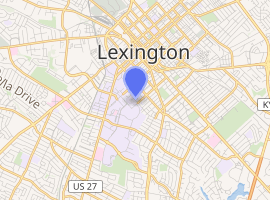University of Kentucky Arboretum
The Arboretum, State Botanical Garden of Kentucky (Also known as University of Kentucky Arboretum or Lexington Arboretum), 40 hectares or 100 acres (0.40 km2), is located at the University of Kentucky in Lexington, Kentucky, United States. It is open to the public from dawn to dusk every day of the year.
| The Arboretum, State Botanical Garden of Kentucky | |
|---|---|

| |
| Type | Arboretum and public park |
| Location | Lexington, Kentucky, United States |
| Coordinates | 38.0333°N 84.5°W |
| Area | 100 acres (0.40 km2) |
| Created | 1991 |
| Operated by | University of Kentucky & Lexington, Kentucky |
| Open | All year |
| Website | arboretum |
It contains the Kentucky Children's Garden, a Home Demonstration Garden which includes a Vegetable Garden, Herb Garden, Home Fruit and Nuts Garden (including Black, Persian and Japanese Walnuts, Pecan, Shellbark and Shagbark Hickory, Chinese Chestnut as well as dwarf apple cultivars, an American Persimmon and native Pawpaw trees), the All America Selection Trials Garden, Perennial Collection, Ground Cover Demonstration, Woody Plant Collection, and a "Walk Across Kentucky" that simulates Kentucky's seven regional landscapes: Bluegrass, Knobs, Appalachian Plateaus, Cumberland Mountains, Mississippian Plateaus and Outer Nashville Basin (Pennyroyal), Shawnee Hills, Mississippi Embayment and Alluvial Basin (Jackson Purchase).
The Arboretum was created in 1991, at which time it was overrun with non-native invasive plants such as honeysuckle and wintercreeper. The removal of such invasive plants has been and continues to be a major goal of Arboretum staff and volunteers.
The Friends of the Arboretum is an organization that supports the arboretum. They offer many opportunities for volunteering at the arboretum. [1] As of 2014 the Director of the arboretum, Molly Davis, has set many goals such as expansion of the visitors center and continue to fight against invasive plants. In order to do this the arboretum needs funding. While the government and personal donations are where the funding comes from now, the arboretum still needs more funding to expand on things such as a bigger victors center and an enhanced prairie area.[2]
Since the arboretum has been in place, the town of Lexington has seen many changes to their environment. These changes are less runoffs from the rain. As well as less CO2 in the air. Both continue to decrease as the arboretum grows. Both are also good for the city as they are attempting to become a more green city.[3]
Gallery
See also
| Wikimedia Commons has media related to University of Kentucky Arboretum. |
- List of botanical gardens in the United States
References
- "Volunteer Now". arboretum.ca.uky.edu. Retrieved June 11, 2020.
- Truman, Cheryl (February 17, 2014). "Arboretum's new director lists priorities: improved funding, new gardens, invasive plants". Lexington Herald-Leader. Retrieved June 11, 2020.
- "Evaluating the UK-LFUCG Arboretum & State Botanical Garden, Natural Resources and Environmental Science Senior Capstone Project 2014" (PDF). University of Kentucky College of Agriculture, Food, and Environment. Retrieved June 11, 2020.
